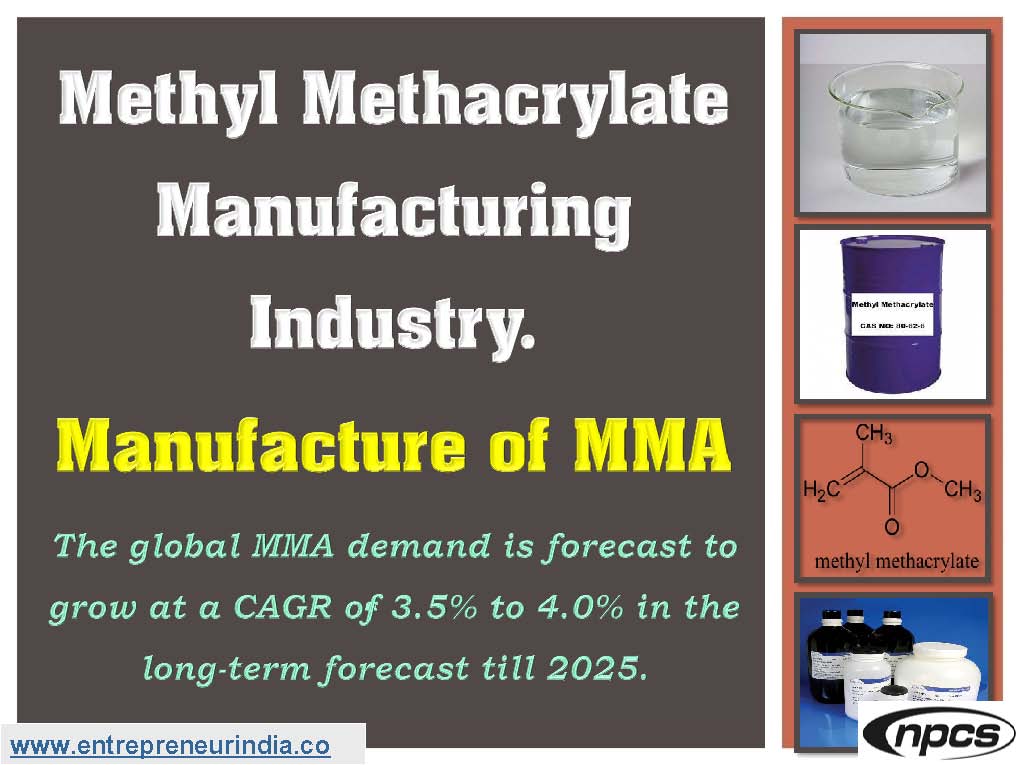
The Methyl Methacrylate Manufacturing Industry is expanding rapidly, fueled by increasing demand in sectors like automotive, construction, medical, and electronics. Methyl Methacrylate (MMA) is a colorless, volatile liquid widely used in the production of polymethyl methacrylate (PMMA) — also known as acrylic or acrylic glass. Due to its outstanding weather resistance, clarity, and strength, MMA is a key ingredient in making durable plastic sheets, coatings, adhesives, and even medical devices. As global markets shift toward lighter, high-performance materials, the Methyl Methacrylate Manufacturing Industry is becoming a strong focus for chemical manufacturers and entrepreneurs alike.
What is Methyl Methacrylate (MMA)?
Methyl Methacrylate is an organic compound with the chemical formula C?H?O?. It is primarily used as a monomer for producing PMMA plastics. MMA is known for its transparency, toughness, and UV stability, making it ideal for products such as car tail lights, signage, optical devices, and dental prosthetics. In the Methyl Methacrylate Manufacturing Industry, it is essential to produce high-purity MMA to serve high-end applications like medical-grade plastics and specialty coatings.
Applications of MMA Across Industries
The Methyl Methacrylate Manufacturing Industry caters to a wide range of sectors:
- Automotive: Used in tail lamps, instrument panels, and trims
- Construction: Acrylic panels, waterproof coatings, noise barriers
- Medical: Artificial teeth, bone cement, and contact lenses
- Electronics: Used in LED light diffusers and displays
- Consumer Goods: Acrylic bathtubs, cosmetic containers, and furniture
The diversity of these applications drives the continuous demand for MMA, making this industry highly resilient and scalable.
Manufacturing Process of MMA
There are multiple methods to manufacture MMA, but the most common is the Acetone Cyanohydrin (ACH) process. This method involves the following key raw materials:
- Acetone
- Hydrogen Cyanide (HCN)
- Sulfuric Acid
- Methanol
The ACH process involves the reaction of acetone with HCN to produce acetone cyanohydrin, which is then converted to MMA through several chemical steps. Other newer technologies like the Methyl Propionate method and direct oxidative esterification are being adopted for cleaner and more efficient production.
In all cases, safety, precision, and environmental compliance are critical due to the toxic and flammable nature of raw materials involved in the Methyl Methacrylate Manufacturing Industry.
Machinery and Plant Setup Requirements
Establishing a manufacturing unit in the Methyl Methacrylate Manufacturing Industry requires:
- Stainless steel reaction vessels
- Distillation columns
- Heat exchangers
- Neutralization tanks
- Gas scrubbers and pollution control systems
- Storage tanks and utility units
A typical medium-scale unit will need around 15,000–25,000 sq. ft. of operational space. Due to the hazardous materials used, safety systems such as fire suppression, leak detection, and emergency ventilation must be built into the plant design.
Investment and Profit Margins
The initial investment for a standard medium-capacity MMA manufacturing plant ranges from ?10 crore to ?25 crore depending on the scale, technology, automation, and safety measures implemented. Cost breakdown includes:
- Machinery: ?6–10 crore
- Civil construction & setup: ?3–5 crore
- Safety and utility infrastructure: ?1–3 crore
- Working capital and licenses: ?2–5 crore
The average market price of MMA varies between ?150 to ?300 per kg depending on purity. The Methyl Methacrylate Manufacturing Industry offers margins between 20–35%, especially when supplying to high-end users or exporting to developed markets.
Regulatory and Licensing Requirements
Operating in the Methyl Methacrylate Manufacturing Industry requires compliance with various national and international regulations:
- Factory License & MSME Registration
- GST Registration
- Environment Clearance (EIA)
- Consent to Establish & Operate from Pollution Control Board
- Hazardous Substance Handling License
- ISO 9001 & 14001 Certification
- Fire Safety NOC
- US FDA or REACH certification (for exports)
Compliance is non-negotiable due to the hazardous nature of hydrogen cyanide and other materials used.
Market Opportunities and Demand Outlook
There is rising global demand for MMA due to the surge in:
- Lightweight automotive parts
- High-end optics and display components
- Durable household goods
- LED lighting covers
- Sustainable construction materials
The Asia-Pacific region, particularly India, China, and Southeast Asia, is expected to lead the growth. India is still reliant on imports, creating an opportunity for local manufacturers to enter the Methyl Methacrylate Manufacturing Industry and reduce import dependency. Export potential is also strong, especially to the Middle East, Africa, and Europe.
Possibilities for Expansion and Diversification
Entrepreneurs in the Methyl Methacrylate Manufacturing Industry can expand or diversify by:
- Manufacturing PMMA molding compounds and sheets
- Producing downstream products like adhesives, sealants, and resins
- Offering toll manufacturing or contract manufacturing for global brands
- Investing in bio-MMA production using renewable feedstocks
- Partnering with automobile or electronics OEMs for backward integration
Technological innovation and green chemistry can give manufacturers a competitive edge in both domestic and international markets.
Conclusion
The Methyl Methacrylate Manufacturing Industry is a future-ready sector driven by increasing demand across industries that value strength, durability, and transparency in materials. With proper infrastructure, technology, and compliance in place, this industry offers excellent growth potential. The large capital investment required is justified by long-term returns, export scalability, and wide-ranging application areas. Entrepreneurs looking to step into advanced chemical manufacturing with global relevance should strongly consider MMA as a viable and profitable venture.
Niir Project Consultancy Services
An ISO 9001:2015 Company
106-E, Kamla Nagar, Opp. Spark Mall,
New Delhi-110007, India.
Email: npcs.ei@gmail.com , info@entrepreneurindia.co
Tel: +91-11-23843955, 23845654, 23845886, 8800733955
Mobile: +91-9811043595
Website: www.entrepreneurindia.co , www.niir.org





